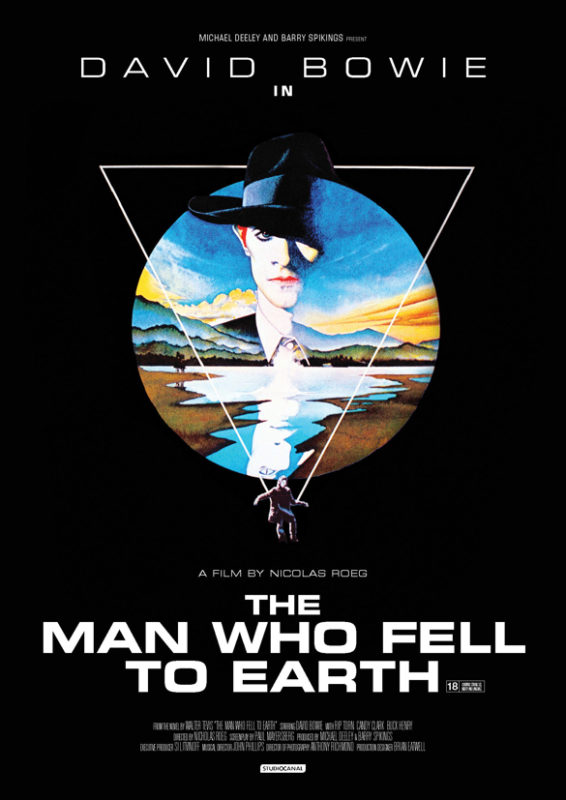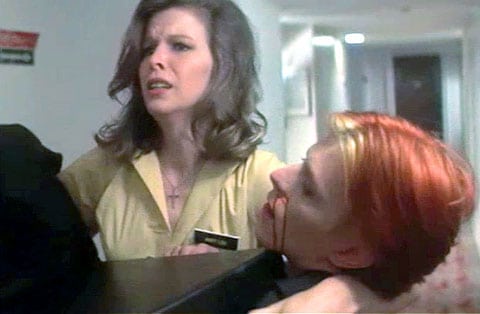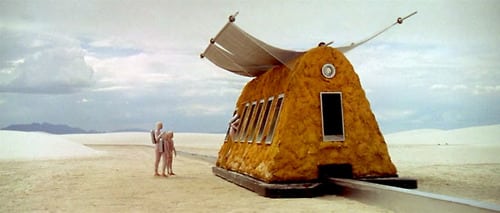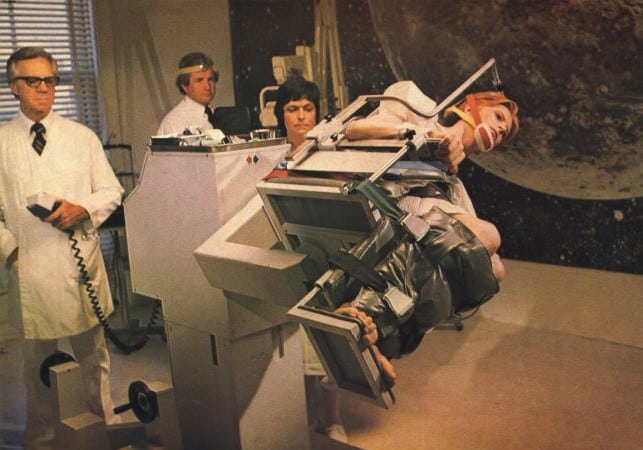The Man Who Fell To Earth (1976)
Directed by: Nicolas Roeg
Written by: Paul Mayersberg, Walter Tevis
Starring: Buck Henry, Candy Clark, David Bowie, Rip Torn
UK
AVAILABLE ON DVD AND BLU-RAY
RUNNING TIME: 140 min
REVIEWED BY: Dr Lenera, Official HCF Critic
Thomas Jerome Newton is a humanoid alien who comes to Earth from a distant planet. He meets with leading patent attorney Oliver Farnsworth and, with his assistance, uses the advanced technology of his home world to patent many inventions on Earth, quickly acquiring incredible wealth as the head of a technology-based conglomerate, World Enterprises Corporation. While visiting New Mexico, he meets Mary-Lou, a lonely, unloved, and simple girl who works as a maid, bell-hop, and elevator operator in a small hotel. She introduces Newton to many customs of Earth, including church-going, alcohol, and sex, and they begin to live together, but Newton is haunted by memories of his family and his drought-filled home planet….
Attending the premiere of the 4k restoration of Nicolas Roeg’s wierd and wonderful science fiction film, to me the greatest film dealing with the subject of an alien from another world coming to ours, was a dream come true for Yours Truly, who’s been fascinated by this picture for about 30 years. The astoundingly visionary work would probably have serious trouble getting made and released in today’s film world [though not long ago we had the magnificent folly that was Cloud Atlas, so occasionally stuff like this does still get through] and can probably be called the definition of a cult film. It’s infuriatingly vague, absurdly laid-back, extremely pretentious, full of seemingly gratuitous aspects like sex and almost constant music from an incredible variety of sources, and virtually goes out of its way to avoid the usual things you would expect in a story like this such as special effects and thrills: in fact, it doesn’t appear to try to appeal to a mass audience at all, yet the era it was made in was full of directors trying to make great films and not seeming to care whether other people would like them. In terms of the more recent decades, I always say that the 70’s the most artistic and daring for cinema, while Nicolas Roeg, for a while, was for me one of the greatest directors in cinema, making five stunning, infuriating pictures which I never tire of revisiting one after the other: Performance [co-directed with Donald Cammell], Walkabout, Don’t Look Now, this one, and Bad Timing. After this, his work stayed interesting for some time though he never attained those giddy heights again. For me, those five films are a perfect example of what can happen when a film-maker with amazing talent sets out to make a picture primarily for the pleasure of one person: himself. Sometimes this can result in absolute garbage, but sometimes the stuff of genius can happen too.
This film was based on a novel of the same name by Walter Tevis. Paul Mayersberg’s screenplay does actually follow its basic plot quite closely, though it makes many things considerably less clear, such as Newton’s mission, which in the film you only learn bits and pieces of and have to try to fill in the gaps for yourself. He also downplayed the political aspect and added many characters and details, included loads of pop culture references, though Tevis’s themes do remain. Peter O’ Toole turned down the title role and Roeg wanted the writer Michael Crighton to play it until Alex Winitsky suggested David Bowie. He was totally off his head during filming with around ten grams of cocaine in him every day, and later said he had no idea of what was being made, though he was always professional on set. Largely shooting in and around Albuquerque, New Mexico, the production stalled with Bowie being ill from drinking bad milk, cameras jamming and a group of Hell’s Angels camping nearby. Bowie wrote a score and some songs, though for some reason Roeg turned his material down. Paramount were supposed to distribute the film but after the studio head Barry Diller saw it he refused to pay for it, saying it was not the movie he had asked for [what on earth did he think it was going to be like, with Roeg, Mayersberg and Bowie on board?]. British Lion sued Paramount and won a small settlement, though Cinema V ended up distributing it in the US. It did just about make its money back, becoming a hit in certain countries like Japan, and quickly became a cult favourite. The original US release lost 20 mins of sex and strangeness, and the BBC’s UK TV version was altered too, cutting one sex scene, re-framing one shot in another, and darkening a third. I recall being unexpectedly greeted by the sight of Bowie’s and Rip Torn’s members when seeing the film on Channel 4. A pilot for a planned TV series, a little closer to the novel, was made in 1987. I’ve never had the inclination to see it.
The opening scene, superbly set to a piece of music [Stomu Yamashta’s Poker Dice] which opens with a single repeated piano note backed up by strange percussion and gradually becomes a jazz-like frenzy], is about as beguiling a beginning as you can get, stock footage of a meteorite cutting to a shot of the silhouette of a man stumbling down a hill, his awkwardness then shown by edgy hand held camerawork for a few seconds until he finds himself on a road and the first example of sheer and utter genius in the film reveals itself: the way Anthony Richmond’s cinematography somehow – and I can’t really pinpoint exactly how he does it – shows our world from the point of view of an alien visitor. We also get some nice foreshadowing as Newton passes a drunk. All reasonably easy to assimilate, one might say, but then we get the film’s first truly odd scene as we cut back and forth betweeen Newton watching a Japanese noh play and teacher Nathan Bryce engaging in sexual antics with one of his students. Newton seems to have some kind of telepathic link with Bryce throughout, though of course it’s not actually stated. Some feel these early scenes with Bryce are pointless and gratuitous, but the film is, in a way, as much about Bryce, whose meaningless life finds some purpose when he gets a job in Newton’s company, and Mary-Lou, who quickly falls for the incredibly light [she carries him], odd man whose first activities upon seeing her are to faint and throw up, as it is about Newton. After all, these are the only two humans who will learn Newton’s secret.
While its story is basically quite simple, Mayersberg and Roeg take a delight in making it seem as obscure and complicated as possible. Scenes tend to be very short, but things are still taken at a fairly meditative pace. Rather than action, the tale is told more in dialogue which often seem to stress certain lines, though this stressing sometimes goes nowhere. Though we have flashbacks to Newton’s now-desert world and his family struggling to survive, and eventually realise that his objective is to build a spacecraft to take water back home, there’s little urgency. Then there’s bits of business which don’t make much sense and are just damn weird, and that’s without going into how it’s unclear whether some scenes are flashbacks, happening simultaneously or even real. We are told that other visitors are around, but we don’t see them….or do we [who’s that man watching Newton at the start and is he the same man watching him near the end?]? There’s a truly bizarre bit where Newton and Mary-Lou are travelling in a car and a pioneer family from several centuries before are startled by and point in amazement at the car. Faces but not fashions change over what seems like 30 years while Newton remains young. The film’s attitude to its science-fiction elements is curiously lo-fi . Space travel is represented by stock shots. The aliens on Anthea [though it’s never named in the film] wear body suits to conserve water and seem to live in a hunting lodge with sheets for wings that travels on a rail. When Newton reveals himself, he’s simply a man with cat eyes.
The fascination with the sexuality of most of the characters seems to rub some people up the wrong way. I guess if the film was full of violence instead then more would accept it [though I admit that we probably didn’t need to see two of Bryce’s student lovers telling him that he’s not a bit like their father]. Beautiful eroticism showing Newton’s and Mary-Lou’s lovemaking early on contrasts with raunchiness and perverse sexual gunplay later, showing how the characters and their feelings have changed. Then there’s that incredible scene where Newton reveals himself to Mary-Lou, she is terrified and wets herself, then becomes sexually curious and tries to make love to him before giving up. It’s understandable that Bowie has recieved much of the attention in this film, but it means that the incredible perfrormance of Candy Clark throughout hasn’t been given the recognition it deserves. Here, she really makes her situation and emotions believable, while the music [Yamashta’s Memories Of Hiroshima] brilliantly runs alongside the scene, moving from slow discordant chords to a slow rock instrumental which gets more and more intense until it reaches a climax. The whole sequence is one of the greatest in science-fiction cinema, hell – it’s one of the greatest in cinema itself – encompassing so many different emotions [fear, curiosity, embarrassment], cleverly shot, skilfully edited [often intercutting the main action with footage of what I guess is supposed to be Newton and his alien wife having sex, though it’s not clear], superbly scored, intelligently acted, extremely daring [Newton seems to ejaculate from his pectorals], yet in a strange way relatable, and in the end very very sad.
There’s much commentary of the cruelty of modern society, the misplaced fear of the unknown, the evils of television [“the thing about television is that it never tells you anything”] – in fact there’s probably too much commentary in this film, Roeg and Mayersberg sometimes trying to do too much , but isn’t that praise-worthy in an industry when increasingly more films don’t try to do enough? Sometimes it does all seem like just an excuse for editor Graeme Clifford to put together montages, like when Newton has loads of TVs in his house and it’s driving him mad yet he’s addicted, and even supposedly straight forward bits like a guy being thrown out of a window [by assassins wearing sparkly helmets] – a bit which by the way suddenly bursts into two of the best couple of minutes of music ever, a dazlingly great and haunting piece by John Phillips – are oddly staged and edited. The film only just about gets away with things like having a crucial scene from The Third Man playing paralleling what has really been happening, but it does get away with it because I genuinely believe that Roeg’s film is almost as great a one as Carol Reed’s classic.
The Man Who Fell To Earth is a very sad film. Newton, who seems very much like a weaker-willed Jesus [and I have no doubt Roeg and Mayersberg intended this] quickly falls prey to earthly vices, the most damaging of which seems to be drink, and he ends up being betrayed by those closest to him. The weak, almost anaemic alien, who seems to be able to see things taking place in different locations but fails to notice when his mission is getting endangered and cannot even travel in a car faster than 45 mph, is treated horribly, even if he does seem to have a certain arrogance which doesn’t always help his situation. One of the most interesting changes made from the book is when Newton, instead of being accidently blinded, has his contact lenses fixed to his real eyes for good. It’s a puzzling alteration but probably works even better. Sometimes Roeg can be economical when he wants to be, in particular when he jumps forward in time, while despite its peculiarities and overloading of so much, The Man Who Fell To Earth has great heart in it too. In particular, the relationship between Newton and Mary-Lou is genuinely sweet, and there’s a deep melancholy to the piece all the way throughout despite touches of humour here and there.
Bowie certainly underplays his part, but it’s enough, and his fragile state of mind at the time was film was made and his ill health make him simply perfect in the title, alongside his androgenous looks and odd manner. He’s so interesting to watch that one forgets how incompetent his character actually is. I’m sure some Bowie fans are still dreaming of a release of his un-used music for the film [though rumours are that some of what he came up with made it into the albume Low], but the soundtrack, even without Bowie, is outstanding, a complex kaleidoscope of seemingly disparate musical elements woven brilliantly together. It’s a great example of how pop songs can work really well in a film, but there are also some superb instrumental pieces from Phillops and the underrated Yamashta, like the heartbreakingly gorgeous love theme for Newton and Mary-Lou and the atmospheric, dreamy piece heard whenever we see Newton’s planet. There are times in this film when it seems choreographed to the music, so perfectly is it applied.. For reasons which aren’t clear, it took 40 years for a soundtrack album to come out and you can read my review of the just-released double CD here: https://horrorcultfilms.co.uk/2016/09/the-man-who-fell-to-earth-john-phillips-stomu-yamashta-and-others-soundtrack-review/ In any case, The Man Who Fell To Earth is a film that, at least as a commercial product, was really ahead of its time, and is a film that still seems ahead of its time, though it does appear to be more widely liked these days. Of course it’s certainly not for all tastes….but then what films are? I know people who don’t like Star Wars or The Shawshank Redemption even though that is probably inexplicable to many. This haunting, puzzling, mesmserising, endlessly fascinating film might be very odd, but like many of the great films – indeed like many of the great science fiction films – it’s really about us. “We’d have probably done the same to you if you’d come over to our place” says Newton in the film’s superbly succinct final scene….which is also probably the first and only time the film is obvious or straightforward about anything.











Quite amazing – when a friend and myself sat through this at an open air drive-in in an Australian mining town circa August 1977 (we were just 13 and it was winter), we made jokes to each other about the “sparkly helmets”.The version screened that night didn’t have the gun play sex scene or Bowie’s plonker – so we were kinda bored by 3/4 time. Being a teenager who read movie magazines, I was expecting something different. I now own the Blu-ray. Also got the Blu-ray of Eureka, plus I love Performance (I own the DVD of that one – and the soundtrack). You have convinced me to revisit Walkabout, Don’t Look Now and Bad Timing. Great writing – thank you.
Interesting to read about your first experience with this cult classic, and thank you for your kind comment. The cinema lost one of its geniuses with Roeg’s passing.